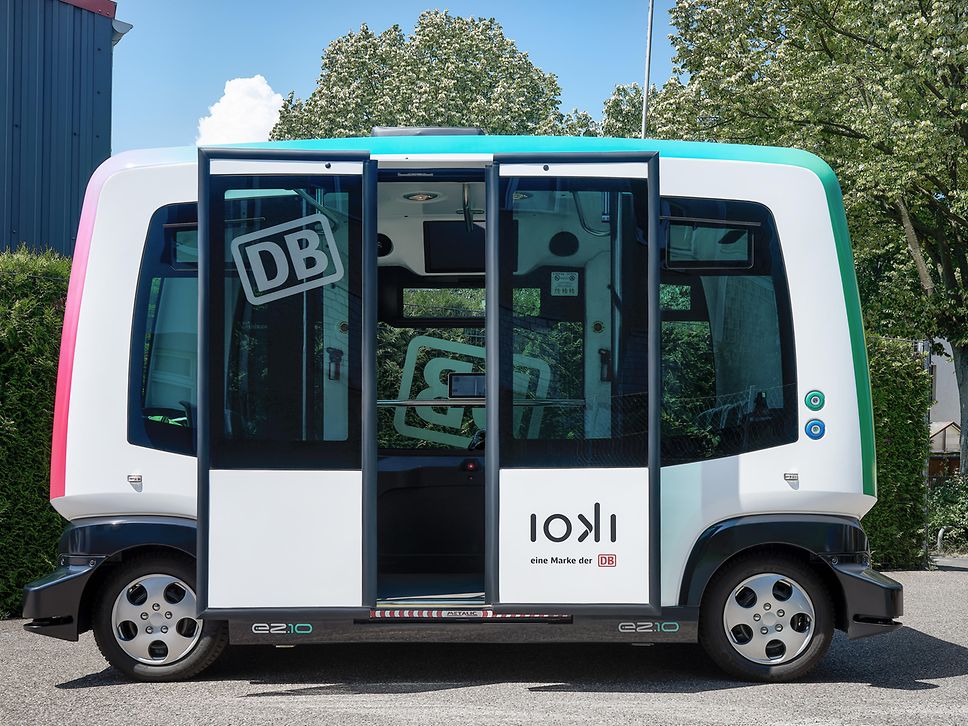Article: ioki
ioki - DB's business unit for sustainable mobility on demand - develops concrete solutions for cities, municipalities, (transport) companies and all those who want to shape the mobility of tomorrow. An interdisciplinary team of IT and transport experts, developers and designers forms the innovative core of ioki. Whether it's holistic mobility analyses that show the current traffic situation and possible gaps in public transport or the digitalisation of existing and new transport systems via the so-called operating system for digital mobility - the DB subsidiary offers all services from a single source and, as a technology partner, makes mobility available to everyone, anytime and anywhere - for driver-based as well as autonomous public transport.
Operating system for digital mobility
Whether it is scheduled, area or mixed transport: with ioki's operating system for digital mobility, all forms of transport can be optimised and digitalised across all modes of transport and in a multimodal way. In addition, ioki provides the platform that enables the integration of demand-oriented forms of mobility both in the existing public transport system and in new systems.
Overall, the operating system consists of three individual applications that interact with each other and together represent a complete mobility ecosystem:

Control centre: Via the control centre, the operator always has an overview of the service, controls the entire scheduling and can intervene in the operation at any time, even at short notice, if necessary.
Passenger app: Thanks to the barrier-free passenger app, the user has everything in one application - from the journey request to the booking and payment.
Vehicle app: The vehicle app provides all journey-relevant information at a glance and is suitable for both driver-based and autonomous transport.
Demand Responsive Transport on ioki.com
Together with RMV, ioki is realising an on-demand project that is unique in Europe
Thanks to the cooperation between the Rhein-Main-Verkehrsverbund (RMV) and ioki, up to 1.8 million people in the Frankfurt/Rhine-Main region will benefit from on-demand solutions to strengthen public transport. Knut, Lahnstar or Emil - with 150 emission-free vehicles, the project funded by the Federal Ministry of Transport and Digital Infrastructure (BMVI, now BMD) is one of the largest on-demand projects in Europe. The software makes the decisive difference by bundling passenger wishes and determining the optimal route based on the bookings. This saves valuable time and closes the gap between conventional public transport services and individual transport. In some service areas, a dedicated routing system for on-demand shuttles is also used to guide passengers from the train to the on-demand shuttle with signs and signage.
ioki Hamburg - modern, sustainable mobility with on-demand shuttles on the outskirts of Hamburg
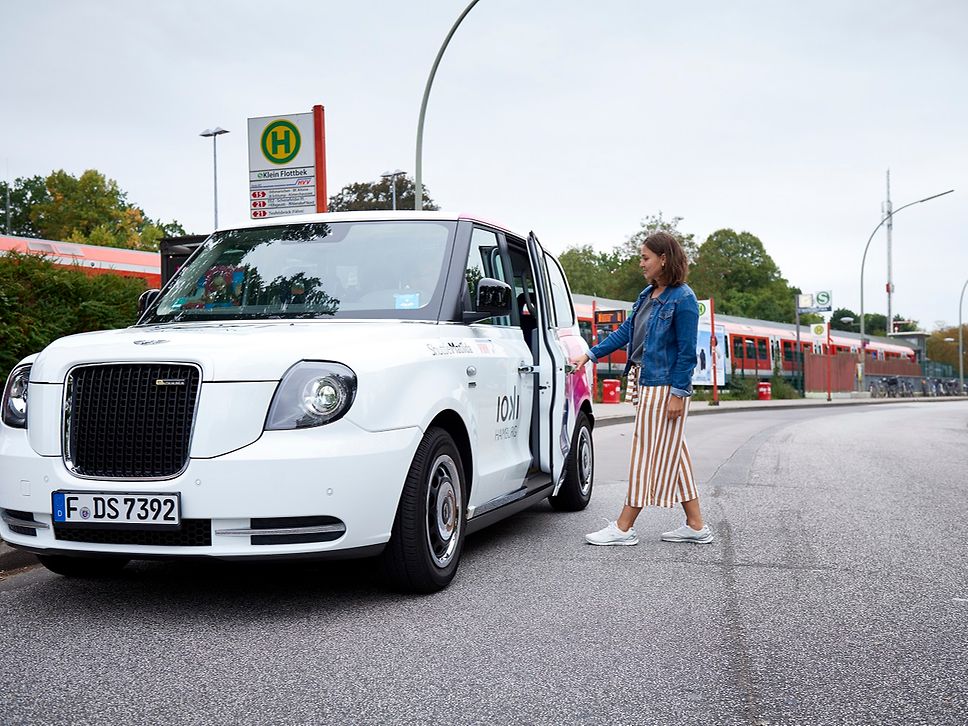
Together with Verkehrsbetriebe Hamburg-Holstein GmbH (VHH) and Hamburger Verkehrsverbund (HVV), ioki has connected the peripheral areas such as Osdorf, Lurup and Billbrook, which have a high residential density but do not yet have strong public transport coverage. The ioki Hamburg service is integrated into the local tariff, thus offering an alternative to private transport that is suitable for everyday use and shows that mobility solutions make an important contribution to inclusion. With success: 72 percent of respondents are driven to or picked up from the nearest public transport stop or station, and more than half of the passengers use the service daily. The project was awarded the German Mobility Prize 2019. In December 2020, ioki Hamburg transport services were expanded to Ahrensburg and the Brunsbek/Lütjensee/Trittau area as part of the Reallabor Hamburg project (regulatory sandboxes) and in cooperation with the city of Ahrensburg and the Stormarn district.
Wittlich Shuttle - Germany's first digital dial-a-bus service
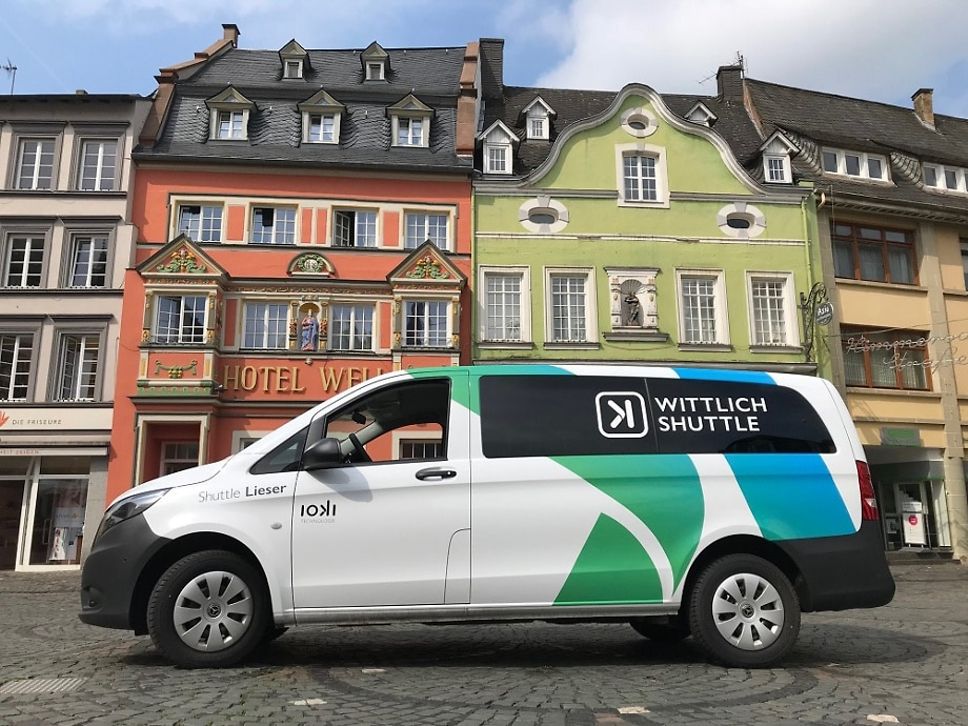
With the Wittlich Shuttle, ioki has for the first time in Germany digitised an existing dial-a-bus and integrated it into the existing public transport tariff. In the small town on the Moselle, older people in particular - in Wittlich the number of over 65-year-olds is over 25% - but also people with limited mobility and commuters benefit from this service.
Digital and demand-responsive commuting solution for employees
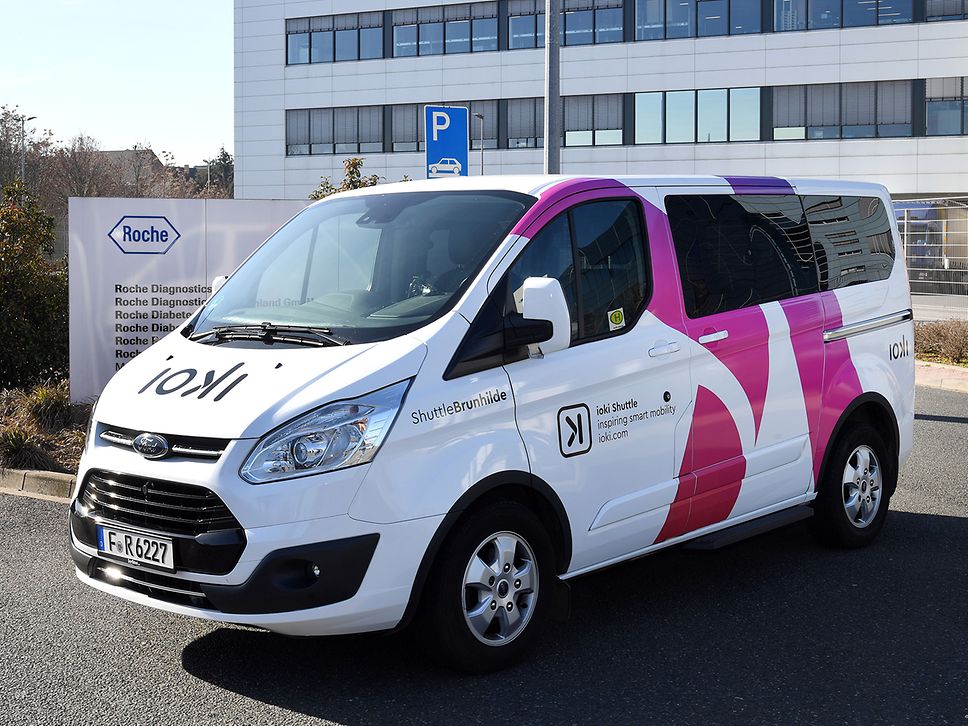
Together with DB Regio Mitte and the company Roche, ioki has launched a unique pilot project for an employee shuttle that is coordinated with existing rail transport. The results underline the advantages of on-demand mobility for the employees, the operational process and the sustainability of the company - the networked mobility concept also convinces car drivers of public transport.
Mobility data guide the way
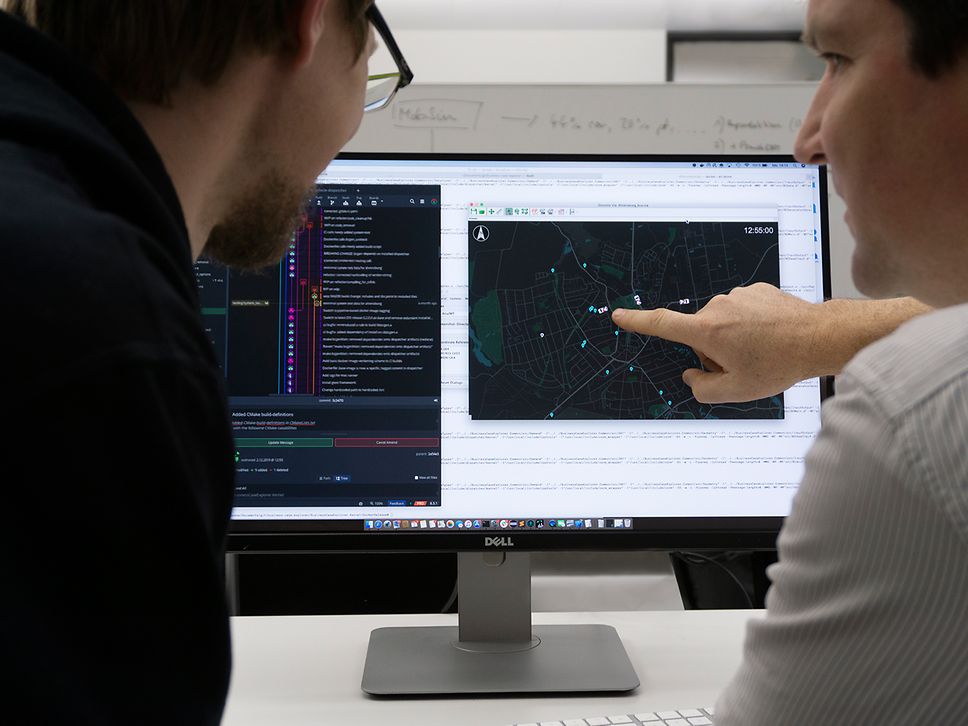
From the inventory to the data-based decision matrix to the precise planning of new services: the mobility analytics (on ioki.com) team combines transport planning expertise with technological know-how and provides a comprehensive insight into the current traffic situation by analysing public transport systems. After all, a well-founded evaluation of different planning alternatives is an indispensable basis for the successful establishment of new mobility services to improve or supplement existing systems. Thus, ioki enables an almost completely customisable analysis that provides sound insights into the mobility situation of a region, from the big picture to the finest detail, through which valid statements about current and future potentials can be made using data-based simulations. In addition, ioki also supports the planning of urban and regional infrastructures through sound methodological knowledge in location optimisation.
Study for Hamburg: Saving a thousand tonnes of CO2 every day through integrated on-demand mobility
On behalf of Hamburger Hochbahn, ioki's Mobility Analytics team has investigated what a networked, emission- and barrier-free public transport system could look like in 2030. The analysis shows: around 25 million kilometres are travelled by private vehicles within Hamburg every day. On-demand shuttles can save 6.5 million kilometres of this and thus a thousand tonnes of CO2.
On this basis, a concept was developed in which conventional public transport is linked with new sharing services to form an integrated public transport system (iÖPNV). About 150,000 Hamburg residents - just under 10 percent of the total population - would benefit from a shuttle-based service because they currently have no comparable public transport service on their doorstep. The districts in the north-east of Hamburg in particular, such as Wandsbek, would be significantly enhanced by mobility solutions that follow the individual needs of passengers rather than fixed timetables.
Lake Geneva region: shifting 10,000 car journeys per day to public transport
With the aim of developing public transport in the Geneva-Lausanne-Vevey region into a genuine alternative to private motorised transport, the Swiss Federal Railways (SBB), the Geneva public transport company tpg and its counterpart in Lausanne, tl, have jointly launched the "Arc Mobilité" initiative.
The specific challenge of the initiative is to develop an integrated mobility concept with a multimodal approach that enables the shift of up to 10,000 car trips per day to public transport.
To this end, ioki, together with Accenture and Fjord, was responsible for a comprehensive study in order to be able to develop the new service in line with the actual needs of the users. As part of this study, ioki conducted a data-based mobility analysis. A total of six million journeys were analysed, which were finally sketched out as journey chains according to occasion and time of day for a detailed picture.
ioki study on the quality of public transport services in Germany
The Mobility Analytics experts at ioki have investigated the public transport coverage in Germany and the existing mobility offers in 2021. Their focus: the potential of pooling, on-demand and sharing offers with a special emphasis on rural areas. Almost 94 percent of the population can easily reach a public transport stop on foot, that is almost 52 million inhabitants in urban regions and 27 million in rural areas. Access is therefore high overall. However, if the quality of the service is taken into account, there is a clear difference between urban and rural areas: 90 per cent of the population in cities have an hourly service in each direction, but only 63 per cent in rural areas. There is also an urban-rural divide in new forms of mobility: More than 90 percent of on-demand services, rental bikes and e-scooters are located in the centres of large cities. On-demand services that are fully integrated into the existing public transport system could replace the private car for the journey to the station and thus offer around 25 million people an additional attractive option to the private car.
API: Interface to intermodal mobility
The overarching goal of making mobility easy and flexible to use for everyone is also behind ioki's specially developed technical interface (API on ioki.com). With the interface, driver-based and autonomous on-demand services can be booked and orchestrated directly via an existing Mobility as a Service app. For the end customer, it means that they can continue to use their familiar mobility app and can query and book all means of transport via one app. The ioki software is fully integrated into the app and provides a holistic mobility offer in the background.
Autonomous public transport
As a pioneer for digital and demand-responsive transport, ioki not only offers intelligent solutions for the analysis and digitisation of driver-based services, but also enables both equally for autonomous public transport. With the first autonomous bus line on public roads in Germany, ioki already set the pace for autonomous driving in public transport (on ioki.com) in 2017. ioki is also involved in the realisation of autonomous public transport within the framework of initiatives such as the Karlsruhe project EVA-Shuttle led by the Research Centre for Information Technology (FZI). As the only company in Europe, the software powered by ioki enables autonomous driving to be combined with on-demand solutions, integrated into the existing public transport system.
Bad Birnbach - first autonomous vehicle on public roads in Germany
In the Lower Bavarian spa town of Bad Birnbach, DB, headed by ioki, has been operating Germany's first autonomous bus line on public roads since October 2017. Drivers and pedestrians encounter an electric bus that is not only quiet and environmentally friendly. It also has no driver and no steering wheel or accelerator pedal. Only an attendant is on board who can intervene if necessary. The vehicle drives through the town and, since October 2019, also to the railway station.
